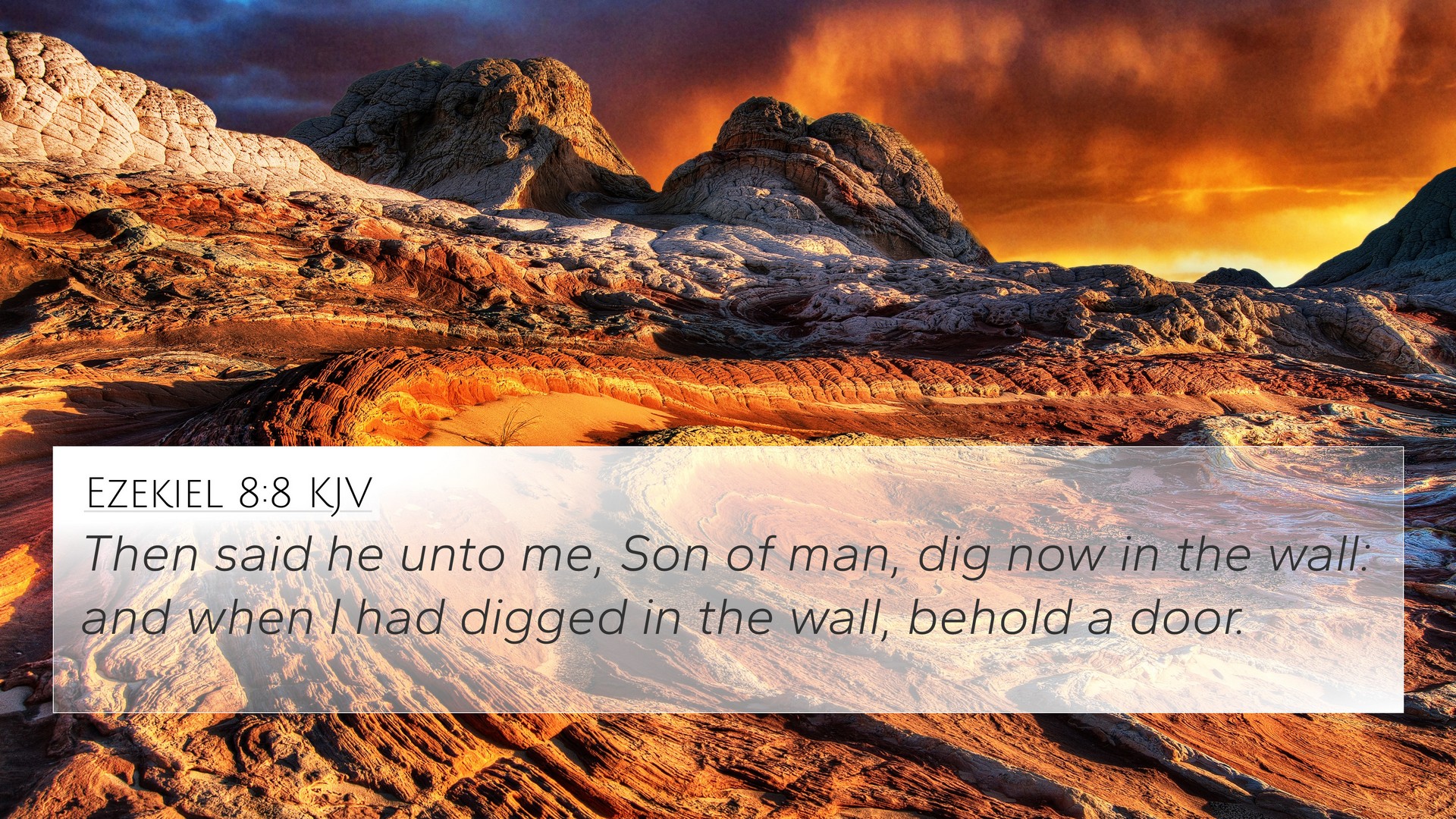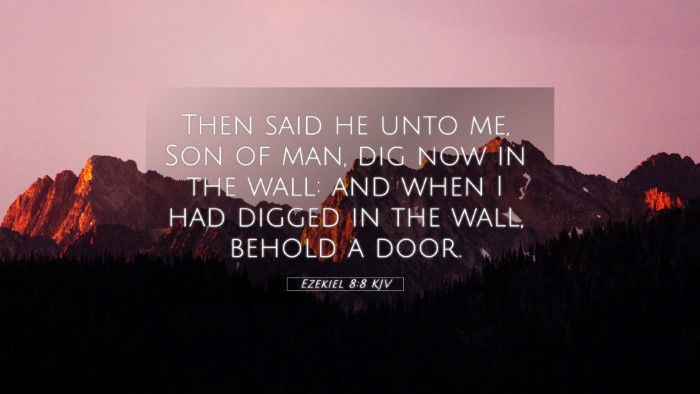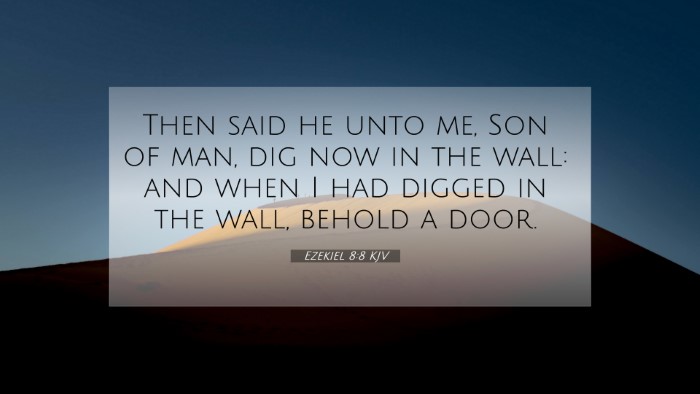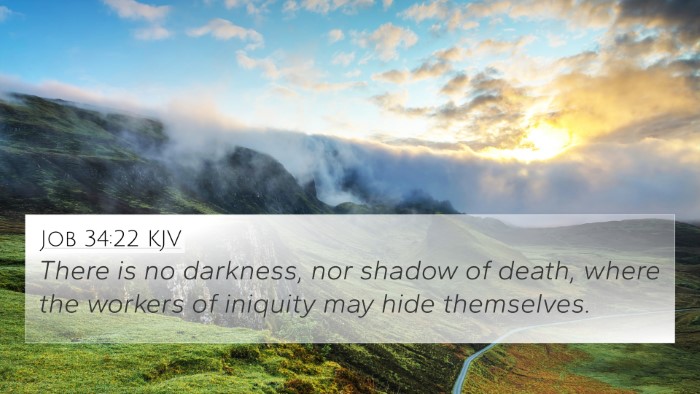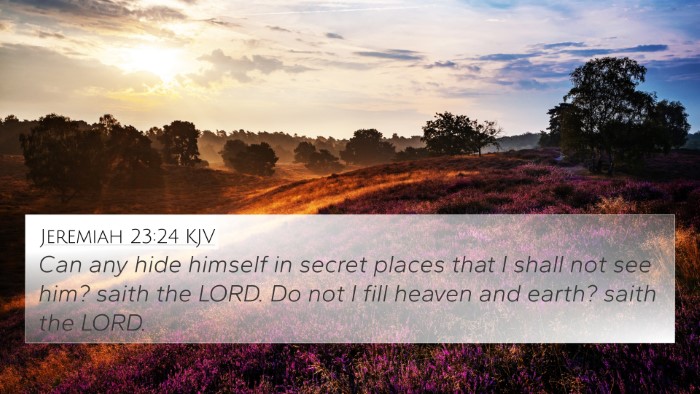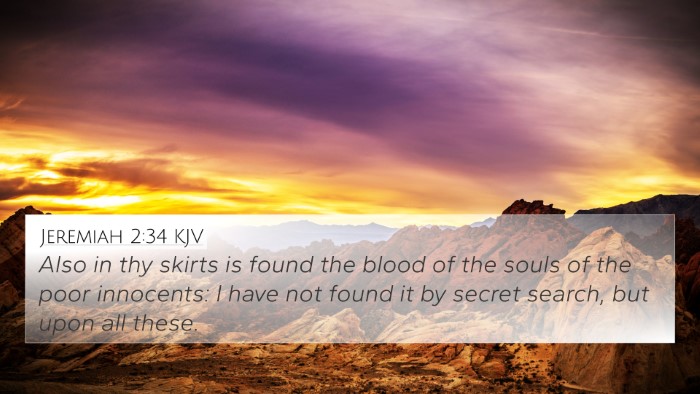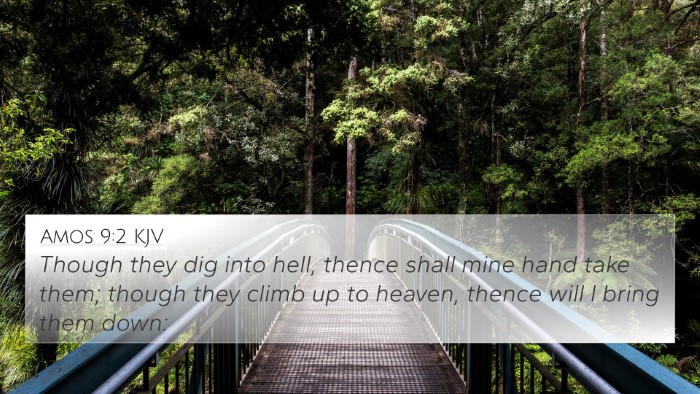Ezekiel 8:8 - Meaning and Interpretation
Ezekiel 8:8 states: "Then said he unto me, Son of man, dig now in the wall: and when I had digged in the wall, behold a door." This verse is part of a prophetic vision where the prophet Ezekiel is shown the abominations taking place in Jerusalem, particularly in the temple. To understand this verse, we can draw from various public domain commentaries such as those by Matthew Henry, Albert Barnes, and Adam Clarke.
Overview of Ezekiel 8:8
This passage describes a moment of revelation and discovery, where Ezekiel, prompted by the Lord, is instructed to dig into the wall of the temple, leading to the uncovering of deeper insights into the sinful practices occurring within. This act symbolizes the need for believers to investigate their spiritual lives and discern the hidden wrongs that may reside within.
Commentary Insights
Matthew Henry's Commentary
According to Matthew Henry, this verse serves as a symbolic act of uncovering. The context of the chapter reveals that God's presence is not being honored as it should be, and the digging represents an inquiry into the unfaithfulness of His people. Henry emphasizes that God, through this revelation, calls upon His followers to confront uncomfortable truths about their worship and practices.
Albert Barnes' Commentary
Albert Barnes explains that the command to "dig" signifies an effort to get to the bottom of sin and corruption. The “door” that Ezekiel finds may represent new revelations and understanding about the things that have been kept hidden from the righteous. He notes that such revelations are essential for true repentance and renewal in the community of believers.
Adam Clarke's Commentary
Adam Clarke elaborates on the implications of the "wall" as a barrier between unholiness and the sacredness of God's presence. The act of digging symbolizes the call for deep introspection. Clarke points out that every believer is challenged to unearth what lies beneath the surface of their life and worship. The discovery of the door implies that there are new paths and deeper truths waiting to be accessed, reaffirming God’s desire for His people to return to purity.
Cross-References to Ezekiel 8:8
- Ezekiel 2:9-10: Another vision where God reveals His message to Ezekiel.
- Jeremiah 23:29: The word of God is likened to a fire that uncovers sin.
- Matthew 7:7: Asking and seeking are integral to receiving divine insight.
- Revelation 3:20: Jesus stands at the door and knocks, inviting us to deeper fellowship.
- Proverbs 20:27: The spirit of a man is the lamp of the Lord, illuminating the depths.
- Psalm 139:23-24: A prayer for God to search our hearts and reveal any grievous way.
- Isaiah 58:9: Calls forth the need for confession and reconnection with God.
- Luke 11:52: The scribes were criticized for hiding the key to knowledge.
- Hebrews 4:12: The word of God is alive and active, penetrating to discern thoughts.
- 1 Corinthians 11:28: A call to examine oneself before partaking in holy practices.
Thematic Connections
This verse emphasizes the theme of seeking deeper truths within the context of worship and faith. It revisits the idea that God desires intimacy with His people, urging them to uncover and confront the realities of their spiritual state:
- Searching the Heart: Similar to Psalm 139, this passage insists on introspection.
- Truth Revealed: Echoed in John 8:32, where knowing the truth brings freedom.
- God's Call to Repentance: Found in both Old and New Testament, urging a return to Him.
- The Process of Discovery: Reflected in Acts 17:11 with the Bereans examining the Scriptures.
Conclusion
Ezekiel 8:8 serves as a powerful reminder of the importance of spiritual scrutiny and the need for believers to dig deeper into their faith. The process of excavation through prayer, study, and reflection reveals the hidden abominations that can obstruct one's relationship with God. Utilizing tools for Bible cross-referencing allows one to explore themes and connections between verses that ultimately enrich understanding and draw the believer closer to the heart of God.
Cross-Referencing Practices
Engaging in cross-referencing Bible verses not only illuminates the insights from Ezekiel 8:8 but also enhances the believer's comprehension of Scriptural truths. Learning how to effectively use a Bible concordance or Bible cross-reference guide can transform one's study time:
- Focusing on interconnections between Old Testament prophecies and New Testament fulfillments.
- Exploring comparative studies among the Gospels and their thematic parallels.
- Identifying connections between Paul's epistles and teachings of Jesus.
- Utilizing resources to build a network of related verses that support sermon preparation or personal study.
